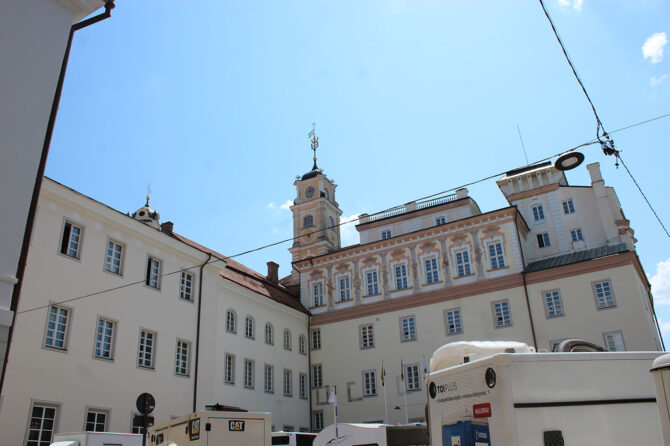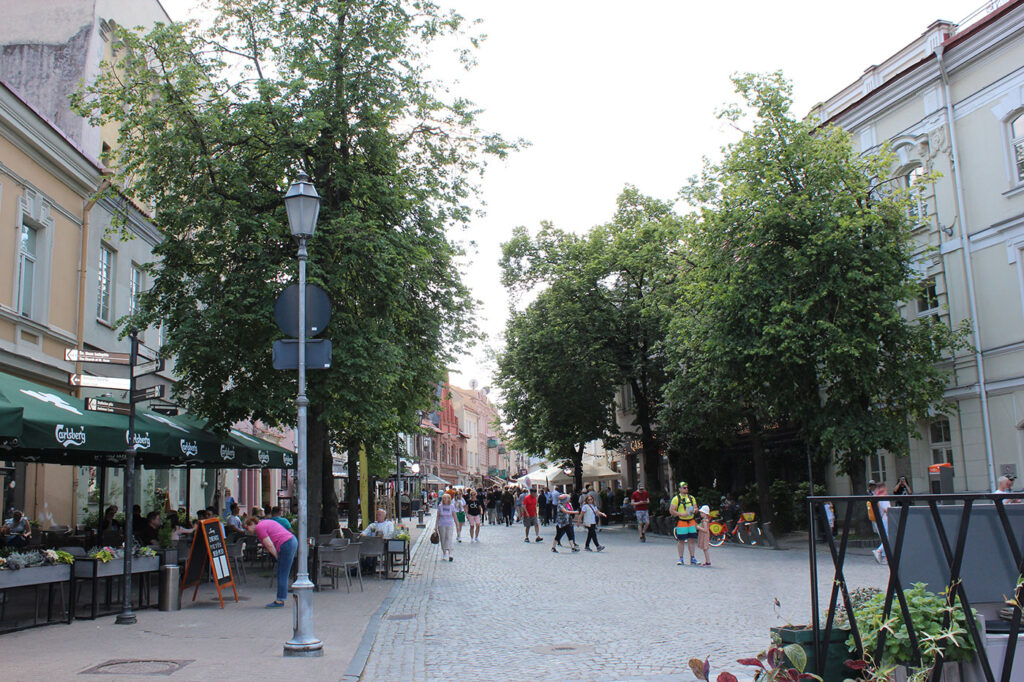
The air in Vilnius seemed to carry a peculiar vibrancy, a blend of the old and the new that whispered tales of times long past. I had arrived in Lithuania’s storied capital to immerse myself in its cultural tapestry, but little did I know that my footsteps through the cobbled streets would lead me to an intellectual and spiritual awakening.
In many parts of the world, actions are infused with hopes and the divine—making wishes in temples, circling their perimeters in the belief that this ritual will coax fate into favor. I, too, have partaken in these rituals, my footsteps a silent prayer, circling the sanctums three, sometimes five times, surrendering my aspirations to the unseen. For me, it seemed to follow the law of probability—some wishes were granted, and some slipped away. When fortune smiled, I sent my thanks to the deity that listened; when it turned its back, I accepted my own role in the dance of chance.

Our journey began, like many others, amidst the reverence of sacred traditions. We found myself standing next to the historic Basilica Belfry, facing two enigmatic carvings on the ground—steps that, according to local lore, could grant wishes when circled three times. Skeptical yet intrigued, my wife followed the ritual, her footsteps a silent echo against the stone, entrusting her desires to the mystical heart of Vilnius. Though I had the urge to ask her what her wish was, I refrained. I knew that most likely it would be about my safety and health, thus potentially restricting my mobility.
Venturing from the belfry and paying homage to the statue of Grand Duke Gediminas, we continued toward Vilnius University. The pathway to the university was an open canvas, painted with bustling eateries and quaint sit-outs framed by lush gardens. This vibrant scene was but the university’s festive threshold, an appetizer to the main course of historical and academic richness that awaited.

Vilnius University was a testament to education and legacy. Founded in 1579 as the Jesuit Academy of Vilnius by King Stephen Báthory, it was the third oldest institution of higher learning in the Polish-Lithuanian Commonwealth, a crucible of knowledge that had withstood the tides of time.
Walking through the university grounds, I felt the embrace of the past. The institution was not just a collection of buildings where young minds were moulded; it seemed to transcend time, appearing as much a bastion of faith as it was of education. The buildings themselves looked like basilicas, with crosses proudly perched atop their spires, gleaming as though they were conversing with the heavens above.

Within its hallowed halls, the air was heavy with a sense of devotion. Walls adorned with art, echoing the sacred aura of nearby churches, enveloped me in a serene tranquillity. Each step I took across the historic floors seemed to resonate with the quiet contemplation of scholars from centuries gone by.
It was here, within these walls that blended the secular with the divine, that I found myself reflecting on the nature of innovation—a subject I had come to explore in depth. I considered how innovation lies on a spectrum, manifesting in various forms and serving diverse purposes.
At one end of this spectrum were business model innovations, such as the subscription services of Netflix, that had redefined entertainment consumption. Then there were process innovations like Toyota’s lean production system, emphasizing efficiency and continuous improvement. And, of course, technological innovations—like the autonomous Roomba or powerful GPUs—had reshaped our interactions with the digital and physical worlds.

Each step through the university was a step through history—a journey through the myriad ways in which human creativity and ingenuity have evolved. The university itself was an innovation of its age, its purpose having shifted and expanded throughout its storied history.
As I meandered through the courtyards, the idea of meeting known needs better, meeting the same needs differently, and addressing previously unrecognized needs became clear. ABS technology in cars, the ride-sharing revolution initiated by Uber, and the creation of social media platforms and Twitch—all stood as beacons along the innovation spectrum. Each was transformative, reshaping not just markets but societies, influencing how we perceive and interact with the world around us.

Vilnius University was the embodiment of this transformative power. Its inception addressed the known need for education, its evolution met the same need differently through the centuries, and today, it continues to uncover and address needs that we are only beginning to understand.
As I traversed the campus, it became evident that this was where potential met possibility. Students and professors moved with purpose, their aspirations palpably mingling with the echoes of the past. Each discussion, each lecture, seemed to hold the seeds of the next great idea, the next leap forward.

The university’s contributions to society, as with any institution of its calibre, were not merely academic. They were also cultural, ethical, and, fundamentally, human. It stood as a crucible where the past and the future were in constant dialogue, where the wishes and footsteps of generations had imprinted a legacy of relentless pursuit of knowledge. I looked back at the towering spires and the stone paths cradling the footsteps of countless dreamers before me. It struck me then that this place was more than a university; it was a sanctuary of the human spirit—a space where wishes might just intertwine with the footsteps of those daring enough to pursue them.
In the end, my journey through Vilnius University was more than a physical traversal. It was a passage through the continuum of human endeavour, a reminder that our reach for the stars has always been rooted in the fertile soil of our collective imaginations. In every stone, in every wish, in every innovation, lies the heart of our shared journey—a relentless march toward a future we shape with every step and every dream.
Prof. Dr. Prahlada N.B
5 November 2023
Jaipur.

















Hello Sir
ReplyHow can i take admission in this university?
Prahlada Sir 👏
Whenever you step into a foreign land….
You are ‘all eyes 👀’…….to the people there & their land, traditions , culture & way of life !
So, also this time, wrt VILNIUS, weaving the intricate details of the land…..
You & your better-half…..
stepped into historic Basilica Belfry’s foot-steps first , encircling it 3 times…a ritual done by all ……before seeking blessings of the mystical heart of Vilnius 💐. Then , after paying homage to Grand Duke Gediminas, the man who built Vilnius …..you delved into the serene atmosphere & interesting aspects of Vilnius university.
Vilnius university founded in 1579, is the oldest & largest Lithuanian higher education institution, & one among the 400 best universities in the world.
Thanks Prahlada Sir, for vivid description of a land called VILNIUS, hitherto unknown to us 💐🤩👏
Reply